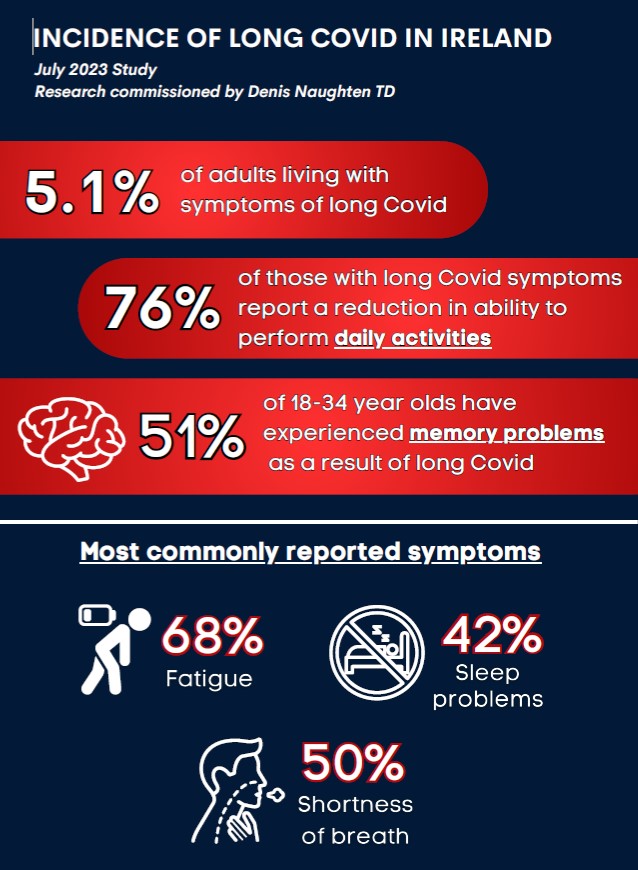HSE figures show long COVID patients wait 15 weeks for a clinical appointment
New polling data released today has found that more than one in every twenty adults in Ireland are actively living with self-reported symptoms of long COVID.
The data is based on a survey commissioned by Independent TD Denis Naughten and conducted by leading polling company Ireland Thinks. Based on figures pertaining to the Irish adult population; the polling data shows that more than 192,000 people across the country could be impacted by long COVID.
The results of the Ireland Thinks survey found that:
- 1% of adults in Ireland are living with self-reported symptoms of long COVID
- 76% of those with symptoms of long COVID report that their ability to perform daily activities has been reduced as a result
- The most frequently reported symptom is fatigue (68%) followed by shortness of breath (50%) and sleep problems (42%)
- Memory problems are more commonly experienced by 18–34-year-olds (51%) compared to those aged 65+ (10%)
A similar study commissioned by Deputy Naughten in November 2022, found that 6% of adults in Ireland were reporting symptoms of long COVID; hence this most recent study shows a marginal reduction in the active community prevalence.
The significance of this reduction unclear but it is expected data from an official HSE commissioned survey on long COVID later this year should provide a greater insight into the emerging trends.
The series of exploratory surveys commissioned by Denis Naughten has shed some light on the prevalence of long COVID by Irish adults self-reporting symptoms, similar to the methodology used in the UK.
This series of surveys is the first of its kind to be conducted in Ireland and offers a stark perspective on the community prevalence of long COVID, which does not currently have a defined treatment pathway.
Deputy Naughten is calling on the Government to work in tandem with the HSE, patients, frontline clinicians and other stakeholders to expedite the delivery of a national action plan on long COVID – to include classifying it as an occupational illness for frontline workers, allocating funding to fully operationalise specialist clinics and recruiting specialist clinicians across the health service.
Aside from the daily challenges of managing symptoms, many adults living with long COVID are unable to return to employment. Of the patients attending the country’s only neurology clinic for long COVID, two-thirds (66%) have been unable to return to full-time work.
Commenting on the findings, Deputy Denis Naughten said: “This polling data demonstrates that between November 2022 to the present day, there has been a reduction, albeit marginal, in the active community prevalence of long COVID. Given the complexity and varied nature of the symptoms being reported, it is imperative that patients receive access to cross-speciality treatment that meets their care requirements.
“As per figures released by the HSE, we know that patients are waiting an average of 15 weeks for an initial appointment at a long COVID clinic – with some waiting up to 35 weeks, as was the case in Tallaght Hospital.
“It is imperative that we treat the scourge of long COVID with the appropriate level of urgency, commensurate with the debilitating nature of the disease and its associated symptoms. A 5% community prevalence of long COVID – as reported in these findings – could lead to a significant future burden of disease, across our health system and society more broadly. We need to see dedicated long COVID clinics established across every hospital group, with adequate multi-disciplinary staff in place to support the prompt rollout of services. These clinics must allow for equitable access to care, so that long COVID patients can be fully supported to recover and resume their lives – something which so many are desperate to do.”
ENDS.
Editor’s notes:
Poll Results July – LongCovid v2
About the polling data:
The poll was conducted by Ireland Thinks between 5th -18th July 2023, with a sample size of 1,004. Ireland Thinks has a panel of 30,000 respondents – its algorithm chooses 5,000 individuals to take part in each poll. These individuals are selected based on their demographics and behaviours (age, gender, religiosity, educational attainment, past voting behaviour) to ensure that the sample is an exact replica of the Census, and within that, the general population. Polling is conducted via an SMS message that is sent directly to participants.
In this poll, respondents were asked whether they had experienced symptoms associated with long COVID following an initial period of infection with COVID-19. Those who reported symptoms were then requested to provide a timeline for the onset and continuation of those symptoms. Those who reported experiencing symptoms beyond 12 weeks were then asked to list symptoms experienced and to describe any changes to their ability to perform daily activities as a result.
For more, visit https://www,irelandthinks.ie
About the population data:
The 3,842,652 figure pertains to the adult population in Ireland. This figure is based on extrapolated 2022 Census, made available via the Oireachtas Library & Research Service.
About long COVID:
The World Health Organisation defines long COVID as the “continuation or development of new symptoms 3 months after the initial months after the initial infection, with symptoms lasting for at least 2 months with no other explanation”.
For 2023, the HSE has allocated €6.6 million to long COVID supports.
